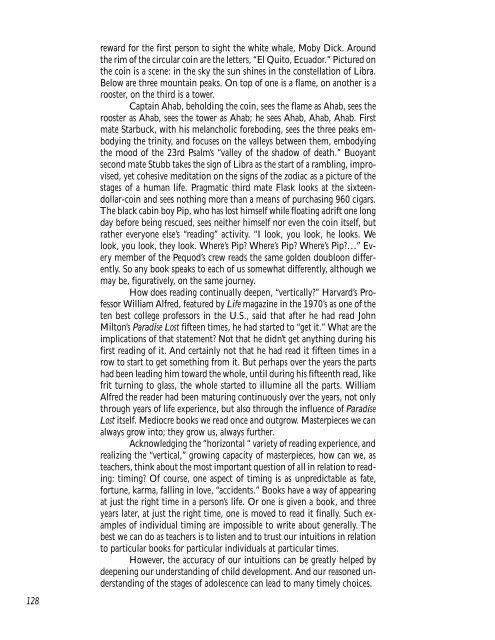Colloquium on English - Research Institute for Waldorf Education
Colloquium on English - Research Institute for Waldorf Education
Colloquium on English - Research Institute for Waldorf Education
Create successful ePaper yourself
Turn your PDF publications into a flip-book with our unique Google optimized e-Paper software.
128<br />
reward <strong>for</strong> the first pers<strong>on</strong> to sight the white whale, Moby Dick. Around<br />
the rim of the circular coin are the letters, “El Quito, Ecuador.” Pictured <strong>on</strong><br />
the coin is a scene: in the sky the sun shines in the c<strong>on</strong>stellati<strong>on</strong> of Libra.<br />
Below are three mountain peaks. On top of <strong>on</strong>e is a flame, <strong>on</strong> another is a<br />
rooster, <strong>on</strong> the third is a tower.<br />
Captain Ahab, beholding the coin, sees the flame as Ahab, sees the<br />
rooster as Ahab, sees the tower as Ahab; he sees Ahab, Ahab, Ahab. First<br />
mate Starbuck, with his melancholic <strong>for</strong>eboding, sees the three peaks embodying<br />
the trinity, and focuses <strong>on</strong> the valleys between them, embodying<br />
the mood of the 23rd Psalm’s “valley of the shadow of death.” Buoyant<br />
sec<strong>on</strong>d mate Stubb takes the sign of Libra as the start of a rambling, improvised,<br />
yet cohesive meditati<strong>on</strong> <strong>on</strong> the signs of the zodiac as a picture of the<br />
stages of a human life. Pragmatic third mate Flask looks at the sixteendollar-coin<br />
and sees nothing more than a means of purchasing 960 cigars.<br />
The black cabin boy Pip, who has lost himself while floating adrift <strong>on</strong>e l<strong>on</strong>g<br />
day be<strong>for</strong>e being rescued, sees neither himself nor even the coin itself, but<br />
rather every<strong>on</strong>e else’s “reading” activity. “I look, you look, he looks. We<br />
look, you look, they look. Where’s Pip? Where’s Pip? Where’s Pip?…” Every<br />
member of the Pequod’s crew reads the same golden doublo<strong>on</strong> differently.<br />
So any book speaks to each of us somewhat differently, although we<br />
may be, figuratively, <strong>on</strong> the same journey.<br />
How does reading c<strong>on</strong>tinually deepen, “vertically?” Harvard’s Professor<br />
William Alfred, featured by Life magazine in the 1970’s as <strong>on</strong>e of the<br />
ten best college professors in the U.S., said that after he had read John<br />
Milt<strong>on</strong>’s Paradise Lost fifteen times, he had started to “get it.” What are the<br />
implicati<strong>on</strong>s of that statement? Not that he didn’t get anything during his<br />
first reading of it. And certainly not that he had read it fifteen times in a<br />
row to start to get something from it. But perhaps over the years the parts<br />
had been leading him toward the whole, until during his fifteenth read, like<br />
frit turning to glass, the whole started to illumine all the parts. William<br />
Alfred the reader had been maturing c<strong>on</strong>tinuously over the years, not <strong>on</strong>ly<br />
through years of life experience, but also through the influence of Paradise<br />
Lost itself. Mediocre books we read <strong>on</strong>ce and outgrow. Masterpieces we can<br />
always grow into; they grow us, always further.<br />
Acknowledging the “horiz<strong>on</strong>tal “ variety of reading experience, and<br />
realizing the “vertical,” growing capacity of masterpieces, how can we, as<br />
teachers, think about the most important questi<strong>on</strong> of all in relati<strong>on</strong> to reading:<br />
timing? Of course, <strong>on</strong>e aspect of timing is as unpredictable as fate,<br />
<strong>for</strong>tune, karma, falling in love, “accidents.” Books have a way of appearing<br />
at just the right time in a pers<strong>on</strong>’s life. Or <strong>on</strong>e is given a book, and three<br />
years later, at just the right time, <strong>on</strong>e is moved to read it finally. Such examples<br />
of individual timing are impossible to write about generally. The<br />
best we can do as teachers is to listen and to trust our intuiti<strong>on</strong>s in relati<strong>on</strong><br />
to particular books <strong>for</strong> particular individuals at particular times.<br />
However, the accuracy of our intuiti<strong>on</strong>s can be greatly helped by<br />
deepening our understanding of child development. And our reas<strong>on</strong>ed understanding<br />
of the stages of adolescence can lead to many timely choices.

















